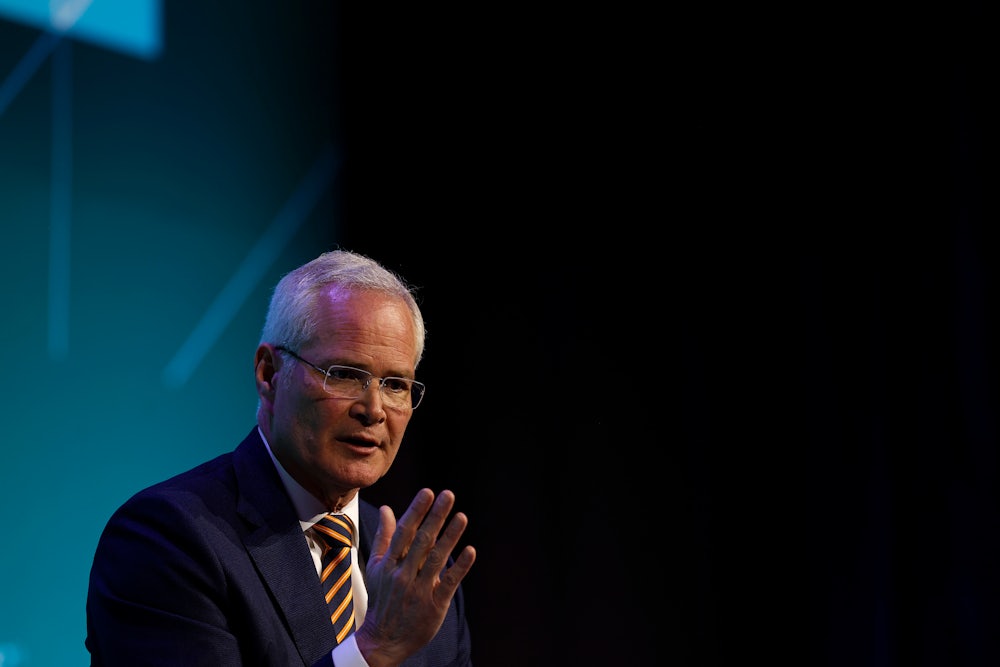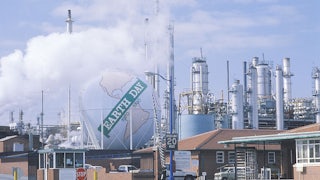Last year, new filings with the Securities and Exchange Commission show, ExxonMobil CEO Darren Woods made $36 million—52 percent more than what he made in 2021 and double his take-home pay the year before. Former Shell CEO Ben Van Beurden—who stepped down at the end of last year—made 53 percent more in 2022 than in 2021. BP CEO Bernard Looney’s earnings more than doubled.
There are plenty of explanations for these executives’ extravagant pay and their industry’s record profits. Any proper account should include the phrase “war profiteer.”
That shouldn’t suggest ExxonMobil and other fossil fuel companies are on the wrong side of the war in Ukraine—they just happen to be making bank off the fact that it’s happening. After Russia invaded in March 2022, they made a show of broadcasting their solidarity with the country and compliance with Western sanctions. And they did take a short-term hit for it: Exxon lost $3.4 billion for exiting its operations in Russia. But the economic and political ripple effects of the war soon redounded to the energy giants’ benefit. By year’s end, ExxonMobil had made a record $55.7 billion.
The spoils of war aren’t distributed equally, though. Beyond the combat deaths and devastation that have helped fuel Woods’s and his colleagues’ rising fortunes are the declining wages of his own workforce. As Exxon returned 86 percent more to its shareholders amid surging profits, the median salary for Exxon employees fell 9 percent in 2022 from 2021. Such trends were mirrored at other companies. Chevron’s median worker pay dropped 12 percent while its profits doubled; in January, Chevron announced plans to triple its budget for share buybacks to $75 billion.
UMass-Amherst economists Isabella Weber and Evan Wasner looked into why profits and prices have risen in a recent working paper—“Sellers’ Inflation, Profits and Conflict: Why Can Large Firms Hike Prices in an Emergency?”—that notes the outsize effect that higher oil and gas prices play in fueling overall inflation. As they explain, the war in Ukraine came at an opportune time for fossil fuel executives. They experienced poor returns over much of the last decade, then Covid-19 shutdowns struck what seemed like a catastrophic blow. Fossil fuel companies begged for bailouts and got some; ExxonMobil lost its spot on the Dow Jones Industrial Average. Corporate managers and their investors wanted to correct for poor performance during the shale boom, when companies drilled so much that they helped lower prices for their product while routinely failing to turn a profit. The pandemic, that is, helped solidify a course correction a long time in the making. Companies continued investing less in production even as prices rose, and tried to get their balance sheets in order, paying down debt and delivering bigger payouts to fed-up shareholders.
Russia invaded as demand was ticking back up due to loosening pandemic restrictions. With less supply readily available and Western countries shunning Russian fossil fuels via sanctions, producers could fetch higher prices. As Woods admitted last year, oil refiners had “created this hole with a lot more capacity coming off-line without a whole lot of new capacity.… That capacity is not coming on. So we’ve got this gap, demand recovers, and we don’t have the capacity to meet that, which has led to a record, record-high refining margins.”
Those record-high margins brought even happier news for producers: The fact that fuel prices were rising let them ask governments, which were eager to lower them, for more handouts. In the United States, the Biden administration has gone out of its way to entice polluters into producing, going so far as to essentially guarantee them a price floor through promises to buy up barrels to refill the Strategic Petroleum Reserve after drawing it down. European governments have relaxed their stances against new fossil fuel development to avert fears of a gas crisis. Governments, that is, are prodding some of the world’s most profitable companies with incentives to chase higher prices.
Such dynamics have helped bring about something like a revolution in how policymakers think about inflation. For decades, economists spread—and media accounts repeated—the idea that inflation was generally the consequence of “overheating.” By that story, spendthrift governments juiced up the economy with too much spending or too-low interest rates. These favorable conditions for investment led too many firms to hire too many workers. That workers could easily go find another job gave them too much negotiating power to demand even more money from their bosses. As a result, workers were making too much money, raising costs for firms while buying too many things; demand outstripped supply. The fix was similarly straightforward: getting the Federal Reserve to raise interest rates, and discouraging investment to the point where companies would stop hiring and paying such allegedly lavish wages. Disempowered workers—or those thrown off the job—would spend less, alleviating demand for key goods and allowing prices to settle.
Weber and Wasner lay out a different story, building on economist Abba Lerner’s concept of “seller-induced inflation.” Some initial shock—say, a war and supply chain issues—offers an excuse for companies to raise prices. Competitors do the same, not wanting to get left behind in a world where consumers are agreeing to pay more. That amplifies through supply chains, as inputs to production get more expensive too. The last stage, they argue, is conflict: where workers fed up with an ever-rising cost of living try to protect their purchasing power, demanding higher wages. Unlike in the common story of inflation—where inflation is caused by workers’ increased bargaining power—Weber and Wasner (among others) describe it as a consequence. Rather than trying to disempower workers by hiking interest rates, they argue that price controls in key sectors—a tool once more commonly used by economic policymakers, and long demonized by mainstream economists—can help get at the root causes of inflation rather than its symptoms.
It isn’t just left-leaning economists agreeing with that. Albert Edwards, a strategist for the French bank Société Générale, warned recently that “greedflation” (profits continuing to increase even as costs fall) could “inflame social unrest” and even set the stage for the “end of capitalism.” He referenced Weber and Wasner’s paper explicitly, noting price control policies may “emerge as a favorite method” for tackling inflation.
While Darren Woods is uncommonly rich, he isn’t uncommonly evil. He and his peers don’t wake up every morning plotting how to make people poorer and destroy the planet. But that’s also not a reason to leave the production, distribution, and pricing of something as essential as energy entirely in their hands. As Weber and Wasner also point out, current inflation may be “transitory”—it’s already beginning to ebb—but the climate crisis promises more real-world shocks, whether through hurricanes taking key infrastructure offline or droughts causing shipping channels to run dry. Ordinary “inflationary cycles” can become downright nightmarish: As climate-fueled shocks offer an excuse for oil and gas executives to demand more of consumers and governments, the emissions they put out into the world threaten to create still more climate shocks, and inflation.
Companies whose mission is to chase profits can be expected to try to make as much money as possible, whether through raising prices or paying their workers less. When it comes to the fossil fuel industry, at least, that impulse just happens to conflict with society’s best interest and the health of the planet. Governments don’t need to keep giving them free rein to chase it.






